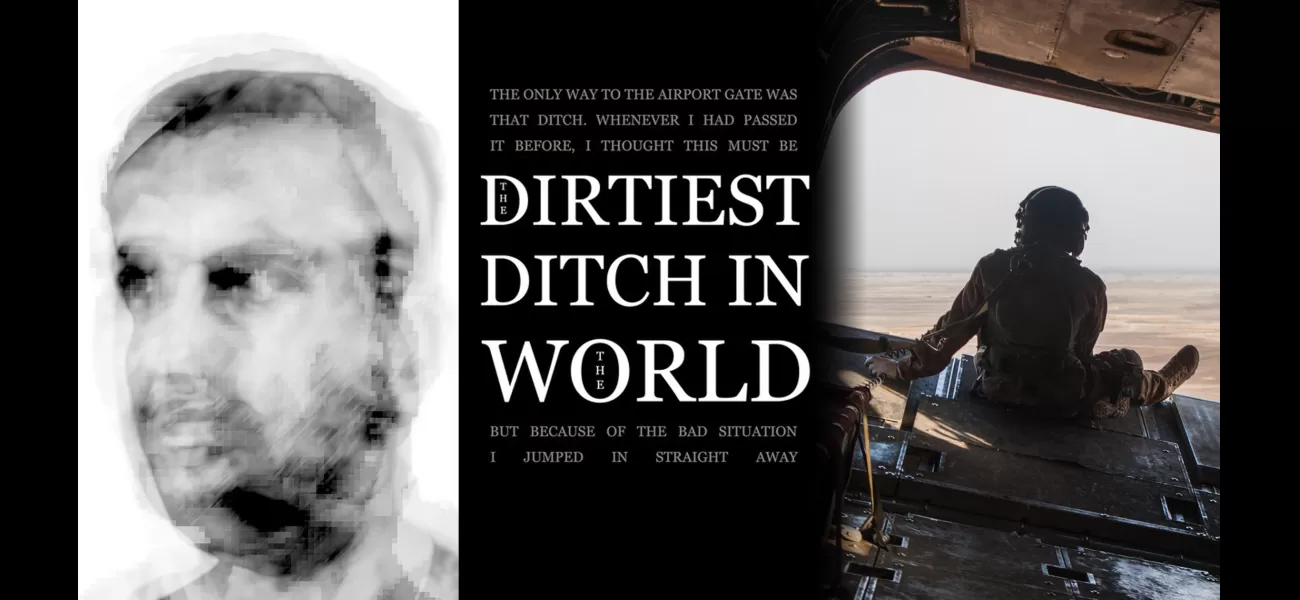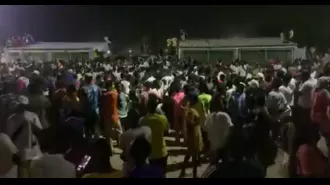Ex-interpreters from Afghanistan still waiting since UK left Former interpreters from Afghanistan still in uncertain situation after UK's departure three years ago.
Afghan refugees are stuck in a state of uncertainty three years after the UK withdrew.
August 28th 2024.

Concerns are being raised about the well-being of former Afghan interpreters who have relocated to the UK, as the country marks the third anniversary of its withdrawal from Kabul. According to campaigners, these interpreters are facing a "postcode lottery" as they try to adjust to their new lives in society. Additionally, they are having to witness the suffering of their loved ones back in Afghanistan, who are being subjected to threats, kidnapping, and extortion by the Taliban.
Advocates for these families report that some of the former interpreters have been waiting for years to be relocated and are still being moved between temporary accommodations in different parts of the UK. This is despite their eagerness to start anew and contribute to their new home. The troubling situation is being highlighted on the third anniversary of the UK's withdrawal from Afghanistan, which followed nearly two decades of intervention after the 9/11 attacks.
Andy Barnham, a former Royal Artillery captain who served two tours in Afghanistan, shared with The Agency that some former interpreters have yet to be relocated, while others have only recently arrived in the UK. He expressed his concern over the varying levels of support and resources available to these individuals, as well as the emotional toll of being separated from their families in Afghanistan, who continue to face danger at the hands of the Taliban.
Former British Army Captain Ed Aitken, who worked alongside Afghan interpreters before co-founding the Sulha Alliance charity, also shared his perspective on the matter. He revealed that some of the interpreters are currently living in isolated military bases in the UK, and their lives have been in limbo for the past three years. Despite their desire to start working and integrating into society, the Ministry of Defence has failed to provide them with a proper foundation for their new lives.
According to official figures, around 27,000 eligible Afghans have been resettled in the UK, including those who worked with the British military or British Council, or are considered vulnerable. Many of them were part of the mass evacuation from Kabul International Airport in the final days of the Western allies' withdrawal, which was carried out amidst chaos and a looming threat of a suicide bomb. The last UK personnel left on a flight that departed on August 28, 2021, marking the end of the largest humanitarian aid operation since the Berlin Airlift.
Despite their sacrifices and efforts to bring about a peaceful Afghanistan, the interpreters are now faced with the harsh reality of living under the Taliban's oppressive regime, which has severely restricted the rights of women and girls. Dr Sara De Jong, co-founder of the Sulha Alliance and a senior lecturer in politics at the University of York, shared that the month of August continues to be a painful reminder for these individuals of their unfulfilled hopes for their country. As she expressed her concerns for their well-being, she also reflected on her own memories of working with Afghan interpreters during her time in the country.
For Andy Burnham, another Afghanistan veteran, his time in the country was defined by acts of kindness and the friendships he formed with strangers who became lifelong friends. He remembers the Italians he worked with in Herat, who took care of him and whom he still holds dear to this day. He also recalls the Afghan National Army unit he mentored in 2008, with whom he formed a strong bond despite regulations prohibiting him from traveling with them. His fond memories and gratitude towards these individuals serve as a reminder of the strong relationships formed during his time in Afghanistan.
Concerns have been raised about the future of the former Afghan interpreters who worked with the British military as the country marks the third anniversary of the UK's withdrawal from Kabul. According to campaigners, these former interpreters now living in the UK are facing a "postcode lottery" as they try to integrate into society. Their families back in Afghanistan are also facing threats, kidnapping, and extortion from the Taliban.
It has been reported that some of these former employees have been in a state of limbo, being moved between temporary accommodations around the UK for years, despite their desperate desire to start their new lives. This troubling situation comes three years after the UK's withdrawal from Afghanistan, a nearly two-decade-long intervention that began after the 9/11 attacks. Even now, some former interpreters have yet to be relocated. Andy Barnham, a former Royal Artillery captain who served two tours in Afghanistan, shared that some interpreters are still in Afghanistan while others have only recently arrived in the UK.
Barnham's words are echoed by Dr Sara De Jong, co-founder of the Sulha Alliance, a charity advocating for the rights of former interpreters. She revealed that some of these individuals are currently living in isolated military bases in the UK, despite their hopes of starting a new life and finding employment. The Ministry of Defence has failed to provide them with a solid foundation for their integration into the country. As a result, their lives have been in limbo for the past three years.
Official figures show that around 27,000 Afghans who worked with the British military or British Council, or are considered vulnerable, have been resettled in the UK. Many of them were part of the mass evacuation from Kabul International Airport as the Taliban took over the country in the final days of the Western allies' withdrawal. British veteran Ahmad Fahim, who helped in the evacuation, recounted the chaos and danger they faced, almost being caught in a suicide bomb attack.
On August 28, 2021, the last UK personnel left Afghanistan, marking the end of the largest humanitarian aid operation since the Berlin Airlift. However, the celebratory gunfire at the airport was short-lived as the Taliban now rule over a repressive regime, severely limiting the rights of women and girls. For Dr Jong, a senior lecturer in politics at the University of York, the month of August will always be a painful reminder of how the sacrifices made by these former interpreters failed to bring about a peaceful Afghanistan.
As we reflect on the third anniversary of the UK's withdrawal from Afghanistan, former British Army captain Ed Aitken shared his experiences working with Afghan interpreters in the country. He fondly remembers the kindness and friendship shown to him by strangers who became friends, and the strong bond he formed with an Afghan National Army unit that he mentored. Despite regulations, Aitken would often travel and patrol with them alone, knowing that they would always have his back. The fate of these former interpreters weighs heavily on his mind, and he hopes that they will be given the chance to build a better future for themselves and their families.
Advocates for these families report that some of the former interpreters have been waiting for years to be relocated and are still being moved between temporary accommodations in different parts of the UK. This is despite their eagerness to start anew and contribute to their new home. The troubling situation is being highlighted on the third anniversary of the UK's withdrawal from Afghanistan, which followed nearly two decades of intervention after the 9/11 attacks.
Andy Barnham, a former Royal Artillery captain who served two tours in Afghanistan, shared with The Agency that some former interpreters have yet to be relocated, while others have only recently arrived in the UK. He expressed his concern over the varying levels of support and resources available to these individuals, as well as the emotional toll of being separated from their families in Afghanistan, who continue to face danger at the hands of the Taliban.
Former British Army Captain Ed Aitken, who worked alongside Afghan interpreters before co-founding the Sulha Alliance charity, also shared his perspective on the matter. He revealed that some of the interpreters are currently living in isolated military bases in the UK, and their lives have been in limbo for the past three years. Despite their desire to start working and integrating into society, the Ministry of Defence has failed to provide them with a proper foundation for their new lives.
According to official figures, around 27,000 eligible Afghans have been resettled in the UK, including those who worked with the British military or British Council, or are considered vulnerable. Many of them were part of the mass evacuation from Kabul International Airport in the final days of the Western allies' withdrawal, which was carried out amidst chaos and a looming threat of a suicide bomb. The last UK personnel left on a flight that departed on August 28, 2021, marking the end of the largest humanitarian aid operation since the Berlin Airlift.
Despite their sacrifices and efforts to bring about a peaceful Afghanistan, the interpreters are now faced with the harsh reality of living under the Taliban's oppressive regime, which has severely restricted the rights of women and girls. Dr Sara De Jong, co-founder of the Sulha Alliance and a senior lecturer in politics at the University of York, shared that the month of August continues to be a painful reminder for these individuals of their unfulfilled hopes for their country. As she expressed her concerns for their well-being, she also reflected on her own memories of working with Afghan interpreters during her time in the country.
For Andy Burnham, another Afghanistan veteran, his time in the country was defined by acts of kindness and the friendships he formed with strangers who became lifelong friends. He remembers the Italians he worked with in Herat, who took care of him and whom he still holds dear to this day. He also recalls the Afghan National Army unit he mentored in 2008, with whom he formed a strong bond despite regulations prohibiting him from traveling with them. His fond memories and gratitude towards these individuals serve as a reminder of the strong relationships formed during his time in Afghanistan.
Concerns have been raised about the future of the former Afghan interpreters who worked with the British military as the country marks the third anniversary of the UK's withdrawal from Kabul. According to campaigners, these former interpreters now living in the UK are facing a "postcode lottery" as they try to integrate into society. Their families back in Afghanistan are also facing threats, kidnapping, and extortion from the Taliban.
It has been reported that some of these former employees have been in a state of limbo, being moved between temporary accommodations around the UK for years, despite their desperate desire to start their new lives. This troubling situation comes three years after the UK's withdrawal from Afghanistan, a nearly two-decade-long intervention that began after the 9/11 attacks. Even now, some former interpreters have yet to be relocated. Andy Barnham, a former Royal Artillery captain who served two tours in Afghanistan, shared that some interpreters are still in Afghanistan while others have only recently arrived in the UK.
Barnham's words are echoed by Dr Sara De Jong, co-founder of the Sulha Alliance, a charity advocating for the rights of former interpreters. She revealed that some of these individuals are currently living in isolated military bases in the UK, despite their hopes of starting a new life and finding employment. The Ministry of Defence has failed to provide them with a solid foundation for their integration into the country. As a result, their lives have been in limbo for the past three years.
Official figures show that around 27,000 Afghans who worked with the British military or British Council, or are considered vulnerable, have been resettled in the UK. Many of them were part of the mass evacuation from Kabul International Airport as the Taliban took over the country in the final days of the Western allies' withdrawal. British veteran Ahmad Fahim, who helped in the evacuation, recounted the chaos and danger they faced, almost being caught in a suicide bomb attack.
On August 28, 2021, the last UK personnel left Afghanistan, marking the end of the largest humanitarian aid operation since the Berlin Airlift. However, the celebratory gunfire at the airport was short-lived as the Taliban now rule over a repressive regime, severely limiting the rights of women and girls. For Dr Jong, a senior lecturer in politics at the University of York, the month of August will always be a painful reminder of how the sacrifices made by these former interpreters failed to bring about a peaceful Afghanistan.
As we reflect on the third anniversary of the UK's withdrawal from Afghanistan, former British Army captain Ed Aitken shared his experiences working with Afghan interpreters in the country. He fondly remembers the kindness and friendship shown to him by strangers who became friends, and the strong bond he formed with an Afghan National Army unit that he mentored. Despite regulations, Aitken would often travel and patrol with them alone, knowing that they would always have his back. The fate of these former interpreters weighs heavily on his mind, and he hopes that they will be given the chance to build a better future for themselves and their families.
[This article has been trending online recently and has been generated with AI. Your feed is customized.]
[Generative AI is experimental.]
0
0
Submit Comment





